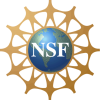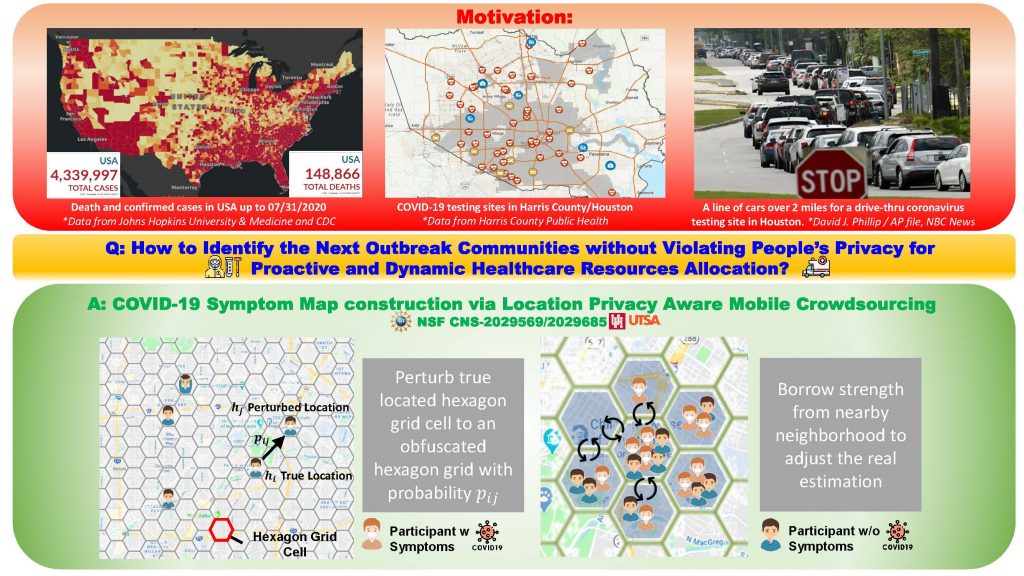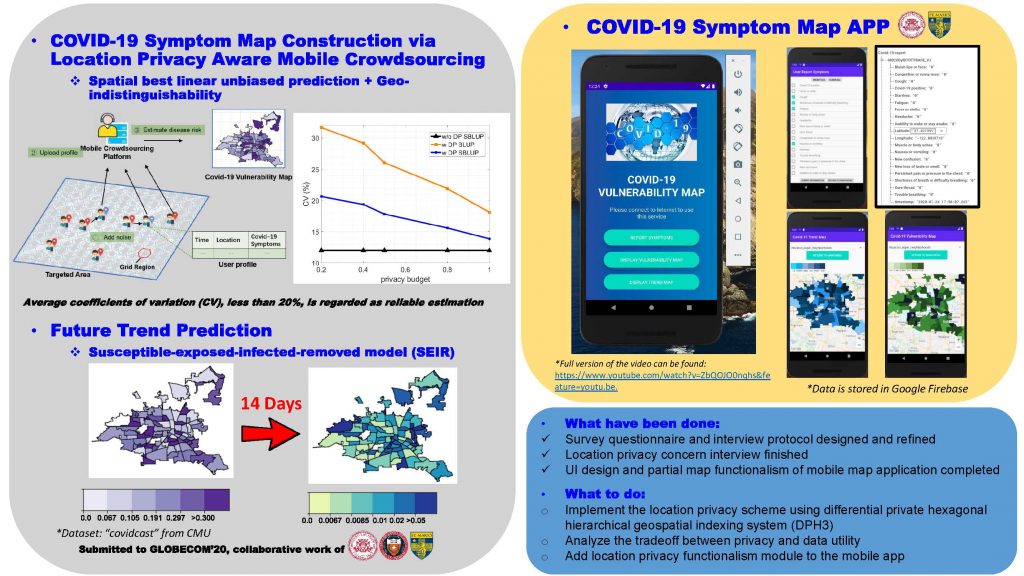 RAPID: Collaborative: Location Privacy Preserving COVID-19 Symptom Map Construction via Mobile Crowdsourcing for Proactive Constrained Resource Allocation
RAPID: Collaborative: Location Privacy Preserving COVID-19 Symptom Map Construction via Mobile Crowdsourcing for Proactive Constrained Resource Allocation
Project Information
- RAPID: Collaborative: Location Privacy Preserving COVID-19 Symptom Map Construction via Mobile Crowdsourcing for Proactive Constrained Resource Allocation, National Science Foundation, September 1, 2018 – August 31, 2021. This is a collaborative project of University of Houston , University of Alabama (PI: Dr. Aijun Song), and Texas Southern University (PI: Dr. Xuemin Chen).National Science Foundation, May 1, 2020 – April 31, 2021. This is a collaborative project of University of Houston (PI: Dr. Miao Pan, Co-PI: Dr. Lan Ni), and University of Texas at San Antonio (PI: Dr. Yuanxiong Guo, Co-PI: Dr. Yanming Gong). University of Houston is the leading institution.
- This webpage and the materials provided here are based upon work supported by the National Science Foundation.
Project Synopsis

The recent pandemic of COVID-19 has caused a public health crisis to US and many other countries in the world. Since there is currently no medication to treat COVID-19, the most challenging question is how to effectively allocate constrained healthcare resources to the next potential outburst communities or areas, so that we can halt or even prevent the virus’ further spreading. The current reactive efforts of relying on people to visit their doctors or testing stations for collecting infection data may not work in an efficient and timely manner due to the limited coverage, high cost, and increased exposure risk for people to be congested at those places. This project develops a fine-grained and location privacy-preserving COVID19 symptom map (CSM) via mobile crowdsourcing, where the symptoms may include fever, cough, or shortness of breath. The proposed CSM is promising in its ability to identify the potential outbreak areas and facilitate the proactive and dynamic allocation of healthcare resources. Meanwhile, the location privacy preserving feature will protect the mobile crowdsourcing participants from bias or discrimination, encouraging them to participate for the public good. The project involves synergized efforts from mobile crowdsourcing, public health science, data analytics, privacy, and social science. Education and outreach activities are designed to increase the participation of women and minority in science and engineering.
This project develops an interdisciplinary framework for location privacy preservation, mobile crowdsourcing, data analytics, social science, and public health science, and contains a research plan with four interconnected thrusts. First, a novel location differential privacy preservation mechanism named differentially private hexagonal hierarchical geospatial indexing system (DPH3) will be developed, which can well represent physical community structure in the map, guarantee mobile crowdsourcing participants’ location differential privacy, and provide high mobile crowdsourcing utility for CSM construction in terms of map coverage and accuracy. Second, a coverage-aware crowdsourcing participant recruitment scheme based on DPH3 and approximation algorithm will be designed to guarantee the crowdsensing coverage while preserving participants’ location differential privacy. Third, a quality-assured CSM will be constructed by using virus propagation model as the prior knowledge for detrending in ordinary kriging and robust estimation for mitigating the impact of location privacy preserving noises added by DPH3. Fourth, a strategic communication approach to community engagement from the perspective of social science will be used to motivate community members’ activeness in information seeking and sharing about COVID-19 symptoms, facilitate crowdsourcing needed for the CSM, as well as empower the community members.
Personnel and Collaborators
Personnel at UH
- Dr. Miao Pan, PI
- Dr. Lan Ni, Co-PI
- Ms. Rui Chen, PhD Student
- Ms. Xinyue Zhang, PhD Student (Graduated in May, 2021; Initial employment: Assistant Professor, Computer Science, Kennesaw State University)
- Ms. Linh Hua, MS Student
- Ms. Rayna Reid, MS Student
- Mr. Jeffrey Jiarui Chen, High School Student (Volunteer)
Personnel at UTSA
- Dr. Yuanxiong Guo, PI
- Dr. Yanmin Gong, Co-PI
- Ms. Rui Hu, PhD Student
Research Progress and Outreach Activities

Publications
- Jeffrey Jiarui Chen, Rui Chen, Xinyue Zhang, and Miao Pan, “A Privacy Preserving Federated Learning Framework for COVID-19 Vulnerability Map Construction”, IEEE International Conference on Communications (ICC’21), Virtual/Montreal, Canada, June 14-23, 2021.
- Rui Chen, Liang Li, Jeffrey Jiarui Chen, Ronghui Hou, Yanmin Gong, Yuanxiong Guo, and Miao Pan, “COVID-19 Vulnerability Map Construction via Location Privacy Preserving Mobile Crowdsourcing“, IEEE Global Communications Conference (GLOBECOM’20), Taipei, Taiwan, December 7-11, 2020.
- Hao Gao, Wuchen Li, Miao Pan, Zhu Han, and H. Vincent Poor, “Analyzing Social Distancing and Seasonality of COVID-19 with Mean Field Evolutionary Dynamics”, IEEE Global Communications Conference (GLOBECOM’20) Special Workshop on Communications and Networking Technologies for Responding to COVID-19, Taipei, Taiwan, December 7-11, 2020.
Links to Code Repositories
- Github Code Links: https://github.com/RuiC8/MapApp
- CSM Mobile APP Instruction: https://www.youtube.com/watch?v=ZbQOJO0nqhs


